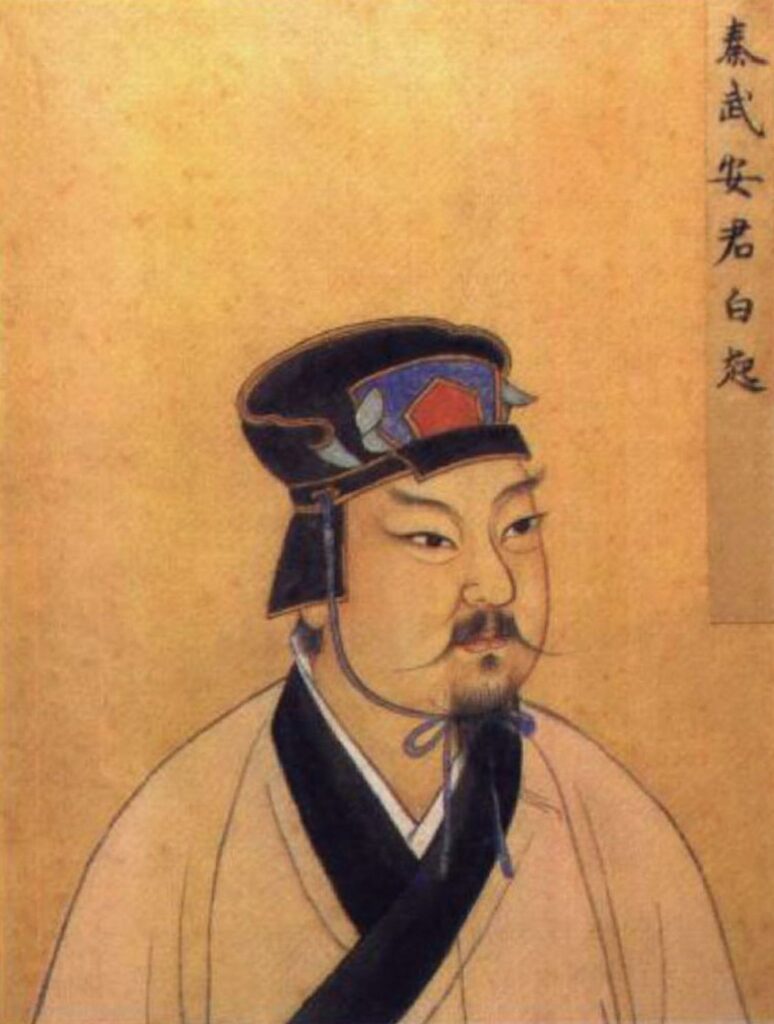Bai Qi (4th–3rd century BCE)
TLDR: Bai Qi, a legendary general of the Qin state, led over 70 victorious battles, inflicting one million casualties and earning the nickname “Human Butcher.”
You know, when I first stumbled upon the story of Bai Qi, I was absolutely floored. Here’s this guy from ancient China who’s basically the Genghis Khan of his time, but way less famous! Born in the 4th century BCE, Bai Qi rose through the ranks of the Qin state’s military like a rocket. I mean, this dude was so good at warfare that he earned the nickname “Human Butcher.” Now, I’m not saying I approve of all the bloodshed, but you’ve got to admit, his strategic mind was something else. From his early days in Mei to becoming the most feared general of the Warring States period, Bai Qi’s life is a rollercoaster of military genius and controversy that I just can’t get enough of.
Early Life and Rise to Power
Bai Qi’s journey to becoming one of the most formidable generals in Chinese history began in the city of Mei, located in present-day Mei County, Shaanxi province. Born around 332 BCE, Bai Qi entered the world during a tumultuous period known as the Warring States era. This epoch was characterized by intense political fragmentation and near-constant warfare among seven major states vying for supremacy.
The Warring States period provided a unique backdrop for Bai Qi’s early years. It was a time of rapid technological advancement, particularly in military technology, with the widespread adoption of iron weapons and the invention of the crossbow. These innovations would later play a crucial role in Bai Qi’s military strategies.
Despite being born into a noble family, Bai Qi’s ascent through Qin’s military ranks was not guaranteed. The state of Qin, under the influence of Shang Yang’s reforms, had implemented a meritocratic system that rewarded individuals based on their military achievements rather than their birth status. This system provided opportunities for talented individuals like Bai Qi to rise through the ranks based on their skills and accomplishments.
Bai Qi’s early military career was marked by:
- Rapid promotions due to exceptional battlefield performance
- Demonstration of strategic acumen in small-scale conflicts
- Gaining recognition from Qin’s leadership for his tactical innovations
As someone fascinated by military history, I find Bai Qi’s rise through the ranks particularly intriguing. It’s remarkable how the meritocratic system in Qin allowed for such talent to be recognized and nurtured. I often wonder about the specific battles or campaigns that first brought Bai Qi to the attention of his superiors.
By his 30s, Bai Qi had already established himself as a military prodigy, commanding an army of 240,000 warriors against the allied forces of Han and Wei. This rapid rise set the stage for his later exploits and cemented his reputation as one of the most skilled generals of the Warring States period.
Military Career and Achievements
Bai Qi’s military career began in earnest with his appointment as Zuo Shu Zhang in 294 BCE, a position that marked the start of his meteoric rise through the ranks of the Qin military. This role, roughly equivalent to a senior military advisor, allowed Bai Qi to showcase his strategic acumen and set the stage for his future conquests.
The Battle of Yique in 293 BCE was Bai Qi’s first major victory and a defining moment in his career. Despite being outnumbered two to one, Bai Qi led the Qin forces to a resounding victory against the combined armies of Han and Wei. His innovative tactics, which included a feigned retreat to lure the enemy into disadvantageous terrain, resulted in the capture of five cities and the decimation of the allied forces. This battle established Bai Qi’s reputation as a military genius and set the tone for his future campaigns.
Following his success at Yi Que, Bai Qi turned his attention to Wei in 292 BCE. In a series of lightning campaigns, he captured an astounding 61 cities, large and small, including the strategically important Wang-yuan. These conquests significantly expanded Qin’s territory and weakened one of its primary rivals.
The Chu campaigns of 280-278 BCE further cemented Bai Qi’s status as the preeminent general of his time. Over three years, he led successive attacks against the powerful state of Chu, culminating in the capture of Ying, the Chu capital. These campaigns forced Chu to cede vast territories north of the Han River and effectively ended its status as a major power in the Warring States period.
Bai Qi’s major achievements include:
- Capturing over 73 cities from rival states
- Maintaining an undefeated record throughout his career
- Expanding Qin’s territory significantly, laying the groundwork for eventual unification
In recognition of his unparalleled success, Bai Qi was promoted to the prestigious title of Wu’an Jun, which can be translated as “Lord of Military Might.” This honor reflected not only his tactical brilliance but also his strategic importance to the state of Qin.
| Campaign | Year (BCE) | Result |
| Yi Que | 293 | Defeated 240,000 allied troops, captured 5 cities |
| Wei | 292 | Captured 61 cities |
| Chu | 280-278 | Captured Chu capital, forced major territorial concessions |
As a military history enthusiast, I find Bai Qi’s campaigns fascinating for their strategic depth and the sheer scale of his victories. The way he consistently outmaneuvered numerically superior forces speaks volumes about his tactical genius. I’m particularly intrigued by how his strategies might have influenced later Chinese military thought, including the famous “Art of War” by Sun Tzu.
Strategic Genius
Bai Qi’s reputation as one of the most formidable generals in Chinese history was built on his exceptional strategic acumen. His tactical approach centered on a fundamental principle: avoiding the enemy’s strengths while exploiting their weaknesses. This strategy was evident in his campaigns, where he consistently outmaneuvered numerically superior forces by identifying and targeting vulnerabilities in their formations or supply lines.
One of Bai Qi’s most effective tactics was his masterful use of deception and ambush. In the Battle of Yique in 293 BCE, he employed a feigned retreat to lure the combined forces of Han and Wei into disadvantageous terrain. This tactic not only neutralized the enemy’s numerical advantage but also allowed Bai Qi to surround and decisively defeat them. His ability to manipulate enemy perceptions and actions was a hallmark of his strategic genius.
Bai Qi’s adaptability to various battlefield conditions set him apart from his contemporaries. He demonstrated this skill during his campaigns against Wei in 292 BCE, where he captured an astounding 61 cities by tailoring his tactics to each unique situation. Whether facing siege warfare, open-field battles, or guerrilla-style conflicts, Bai Qi consistently found ways to turn the tide in his favor.
Key elements of Bai Qi’s strategic approach included:
- Thorough reconnaissance and intelligence gathering
- Rapid maneuvers to exploit enemy weaknesses
- Psychological warfare to demoralize opponents
- Innovative use of terrain and environmental factors
Bai Qi’s strategic brilliance is perhaps best illustrated in the following table, which compares his approach to conventional warfare of the time:
| Aspect | Conventional Warfare | Bai Qi’s Approach |
| Troop Deployment | Mass formations | Flexible, task-oriented units |
| Battle Initiation | Direct confrontation | Deception and misdirection |
| Use of Terrain | Secondary consideration | Primary strategic element |
| Treatment of Prisoners | Capture for ransom or slavery | Often executed to demoralize enemies |
As a student of military history, I find Bai Qi’s strategic innovations fascinating. His ability to consistently outthink and outmaneuver his opponents speaks to a level of tactical genius that was far ahead of his time. The way he integrated psychological warfare into his overall strategy is particularly intriguing to me.
Notable Battles
Bai Qi’s military career was marked by several significant engagements that showcased his tactical brilliance and ruthless efficiency. Among these, the Battle of Huayang in 274 BCE stands out as a particularly devastating victory. In this conflict, Bai Qi led the Qin forces against the combined armies of Zhao and Wei at Huayang, south of present-day Zhengzhou, Henan. Demonstrating his trademark strategic acumen, Bai Qi not only defeated the allied forces but also executed a staggering number of enemy soldiers. Reports indicate that he massacred around 150,000 troops in total, with 130,000 Wei soldiers and an additional 20,000 Zhao soldiers being killed and thrown into a river.
The attacks on Han between 265-263 BCE further cemented Bai Qi’s reputation as a formidable military commander. In 264 BCE, he successfully besieged five Han fortresses, a campaign that culminated in the decapitation of 50,000 enemy soldiers. This series of attacks continued into 263 BCE, with Bai Qi leading a force of 200,000 men against a combined Han-Wei army of 300,000. His tactical prowess was evident as he managed to capture Yowang and disrupt the connection between Shandong and the Han capital, effectively isolating Han’s forces.
Bai Qi’s expertise in siege warfare and city captures was a hallmark of his military career. His campaigns often resulted in the rapid acquisition of multiple cities and strategic positions. For instance, during his campaigns against Wei in 292 BCE, Bai Qi captured an astounding 61 cities, both large and small, including the strategically important Wang-yuan. This ability to quickly overwhelm and capture fortified positions was a key factor in Qin’s territorial expansion under Bai Qi’s leadership.
| Battle/Campaign | Year (BCE) | Outcome |
| Huayang | 274 | Defeated Zhao-Wei alliance, killed 150,000 troops |
| Han Fortresses | 264 | Captured 5 fortresses, executed 50,000 soldiers |
| Wei Campaign | 292 | Captured 61 cities |
As a student of military history, I find Bai Qi’s siege tactics particularly fascinating. His ability to capture multiple cities in rapid succession speaks to an advanced understanding of logistics and resource management that was ahead of his time. The sheer scale of his victories, while brutal, provides valuable insights into the nature of warfare during the Warring States period.
Military Innovations
Bai Qi’s military genius extended beyond his strategic acumen to include significant innovations in warfare techniques. One of his most notable contributions was the integration of cavalry tactics into the Qin army’s operations. During the Warring States period, cavalry was becoming increasingly important, and Bai Qi recognized its potential as a game-changing force on the battlefield. He effectively used mounted units for rapid maneuvers, allowing for surprise attacks and quick exploitation of enemy weaknesses. This integration of cavalry tactics was particularly evident in his campaigns against Wei and Han, where he utilized the mobility of horsemen to outflank and encircle enemy forces.
Bai Qi’s effective use of terrain and environmental factors set him apart from his contemporaries. He demonstrated a keen understanding of how to leverage the landscape to his advantage, often using mountainous regions to conceal troop movements or to create advantageous positions for ambushes. This was particularly evident in his campaign against Wei, where he utilized the mountainous terrain of Qin to outmaneuver the enemy forces. Bai Qi’s ability to adapt his strategies to various environmental conditions allowed him to maintain his undefeated record across diverse battlefields.
While less documented, Bai Qi’s proficiency in swordsmanship and close combat techniques likely contributed to his reputation as a formidable warrior. As a general who often led from the front, his personal combat skills would have been crucial in inspiring his troops and maintaining morale during intense battles. This combination of strategic brilliance and personal martial prowess made Bai Qi a truly comprehensive military leader.
Key aspects of Bai Qi’s military innovations include:
- Adaptation of cavalry for rapid, decisive strikes
- Exploitation of terrain for tactical advantages
- Integration of personal combat skills with strategic leadership
| Innovation | Impact on Warfare |
| Cavalry Integration | Enhanced mobility and shock tactics |
| Terrain Utilization | Improved ambush and defensive capabilities |
| Close Combat Leadership | Boosted troop morale and battlefield effectiveness |
As someone fascinated by military history, I find Bai Qi’s innovations particularly intriguing. His ability to adapt and integrate new tactics and technologies into traditional warfare methods speaks to a level of creativity and foresight that was rare for his time. The way he combined cavalry, terrain exploitation, and personal combat skills to create a comprehensive approach to warfare is truly remarkable.

Controversies and Reputation
Bai Qi’s military career was marked by unprecedented success, but it also earned him a notorious reputation that has endured for over two millennia. His most infamous moniker, “Ren Tu” (人屠), which translates to “human butcher,” encapsulates the brutal efficiency with which he conducted his campaigns. This nickname was not merely hyperbole; it was a reflection of the staggering number of casualties inflicted under his command.
Historical records attribute over one million deaths to Bai Qi’s military actions. This astronomical figure, while difficult to verify precisely, speaks to the scale and intensity of warfare during the Warring States period. Bai Qi’s campaigns were characterized by not just tactical brilliance, but also by a ruthlessness that often resulted in mass executions of captured enemy soldiers.
Bai Qi’s approach to warfare extended beyond mere physical combat to include sophisticated psychological warfare and intimidation tactics. He understood that demoralizing the enemy was often as effective as defeating them on the battlefield. Some of his methods included:
- Spreading disinformation to confuse and frighten enemy forces
- Displaying the corpses of defeated enemies to intimidate populations
- Using the reputation of his brutality to encourage surrenders without fighting
The sheer scale of destruction attributed to Bai Qi is both fascinating and horrifying to me as a student of military history. It’s intriguing to consider how his reputation alone might have influenced the decisions of his opponents, potentially saving lives by discouraging resistance. At the same time, the ethical implications of his methods raise profound questions about the nature of warfare and leadership in ancient China.
Final Thoughts
Looking back on Bai Qi’s life, I can’t help but feel a mix of awe and unease. On one hand, his tactical brilliance and swordsmanship skills were off the charts. I mean, the guy practically wrote the book on psychological warfare in ancient China. But on the other hand, the sheer number of lives he took is staggering. It’s wild to think about how one man could have such a massive impact on history, yet remain relatively unknown to many today. His forced suicide in 257 BCE might have been the end of Bai Qi, but it certainly wasn’t the end of his influence on military strategy.

